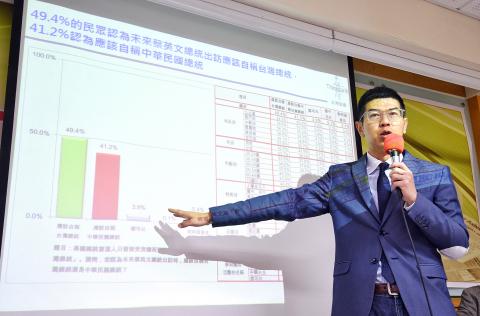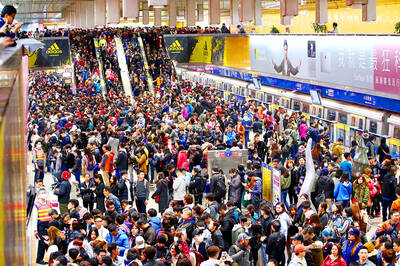About half of Taiwanese said President Tsai Ing-wen (蔡英文) should refer to herself as “the president of Taiwan” while visiting the nation’s diplomatic allies, marking a rise in Taiwanese identification, according to a poll released by the Taiwan Thinktank yesterday.
According to the poll, 49.4 percent of respondents said Tsai should introduce herself as the president of Taiwan — up from 39.8 percent in a May poll by the think tank — while 41.2 percent said she should refer to herself as the president of the Republic of China (ROC) — down from 44.7 percent in May.
Fifty-one percent of respondents said the nation should use “Taiwan” as its official title when participating in international events, while 34.6 percent preferred “the Republic of China” and 9 percent preferred “Chinese Taipei.”

Photo: Liu Hsin-de, Taipei Times
When asked whether diplomatic missions in Taiwan should be identified as “representatives to Taiwan,” as was the case during the administration of former president Chen Shui-bian (陳水扁), or as “representatives to [the Republic of] China,” which has been the case since former president Ma Ying-jeou’s (馬英九) administration, 55.9 percent of respondents said the missions should be referred to as “representatives to Taiwan,” while 26.8 percent said they should be referred to as “representatives to China.”
In terms of Taiwan’s representative offices in other nations — usually called Taipei Economic and Cultural Offices — 66.7 percent of respondents said they should be renamed as “Taiwan representative office,” while 22.14 percent said renaming is unnecessary.
“The poll results suggest a rise in Taiwanese identification especially among young people, with public identification with the ROC on the decline,” Democratic Progressive Party (DPP) Legislator Lee Chun-yi (李俊俋) said.
“The poll shows a stronger public sentiment toward changing the official name of the nation,” New Power Party Legislator Hsu Yung-ming (徐永明) said.
However, the terms “Taiwan” and the “ROC” are not mutually exclusive, as Chen and Ma had used the terms interchangeably, Hsu said.
When the respondents were asked which nation they regarded as the most important to develop close relations with, 42.1 percent said the US, 25.8 percent said China and 13.7 percent said Japan.
In the poll conducted by the think tank in May, 55.6 percent of respondents favored developing close ties with the US, 19.1 percent chose Japan and 15.7 percent preferred China.
The decrease in the number of people favoring stronger Taiwan-US ties might be caused by possible anxiety over deteriorating cross-strait ties, while young respondents aged between 20 and 29 show an evident preference for Japan, Taiwan Thinktank deputy executive director Lai I-chung (賴怡忠) said.
Regarding the controversial participation of retired military officers at a Chinese Communist Party event last month, 73.8 percent of respondents said it is inappropriate for former military officials to engage in political activities in China, while 16.6 percent said it is appropriate.
According to the poll, 73.9 percent said they support the establishment of a legal framework regulating retired military officials’ visits to China, while 16.9 percent said they oppose it.
The poll, which was conducted between Monday and Tuesday last week and collected 1,072 valid samples, has a confidence level of 95 percent and a margin of error of 3 percentage points.

People can take the Taipei MRT free of charge if they access it at Nanjing Sanmin Station or Taipei Arena Station on the Green Line between 12am and 6am on Jan. 1, the Taipei Department of Transportation said on Friday, outlining its plans to ease crowding during New Year’s events in the capital. More than 200,000 people are expected to attend New Year’s Eve events in Taipei, with singer A-mei (張惠妹) performing at the Taipei Dome and the city government’s New Year’s Eve party at Taipei City Hall Plaza, the department said. As people have tended to use the MRT’s Blue or

Civil society groups yesterday protested outside the Legislative Yuan, decrying Chinese Nationalist Party (KMT) efforts to pass three major bills that they said would seriously harm Taiwan’s democracy, and called to oust KMT caucus whip Fu Kun-chi (傅?萁). It was the second night of the three-day “Bluebird wintertime action” protests in Taipei, with organizers announcing that 8,000 people attended. Organized by Taiwan Citizen Front, the Economic Democracy Union (EDU) and a coalition of civil groups, about 6,000 people began a demonstration in front of KMT party headquarters in Taipei on Wednesday, organizers said. For the third day, the organizers asked people to assemble

Taipei is participating in Osaka’s Festival of Lights this year, with a 3m-tall bubble tea light installation symbolizing Taiwan’s bubble tea culture. The installation is designed as a bubble tea cup and features illustrations of Taipei’s iconic landmarks, such as Taipei 101, the Red House and North Gate, as well as soup dumplings and the matchmaking deity the Old Man Under the Moon (月下老人), affectionately known as Yue Lao (月老). Taipei and Osaka have collaborated closely on tourism and culture since Taipei first participated in the festival in 2018, the Taipei City Department of Information and Tourism said. In February, Osaka represented

Taiwanese professional baseball should update sports stadiums and boost engagement to enhance fans’ experience, Chinese Professional Baseball League (CPBL) commissioner Tsai Chi-chang (蔡其昌) told the Liberty Times (sister paper of the Taipei Times) in an interview on Friday. The league has urged Farglory Group and the Taipei City Government to improve the Taipei Dome’s outdated equipment, including relatively rudimentary television and sound systems, and poor technology, he said. The Tokyo Dome has markedly better television and sound systems, despite being 30 years old, because its managers continually upgraded its equipment, Tsai said. In contrast, the Taipei Dome lacked even a room for referees